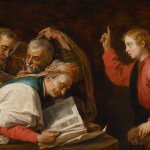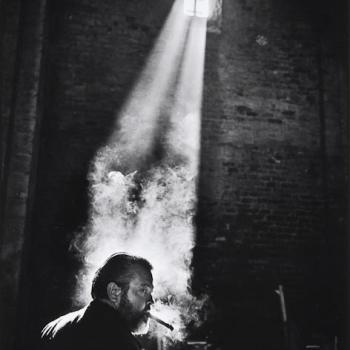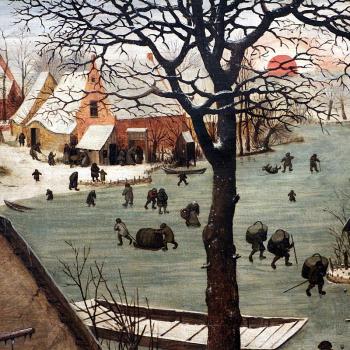What do I mean? I mean that, as the narrative stands, the Great Books are good because they are traditional, as the taglines on some of the websites linked to above attest. This is a half-truth. Humanism is an ill-defined term, but, in almost any normal definition, it is set over and against medieval modes of learning. One can exaggerate this difference, but humanism tends to emphasize the will and, well, human agency. Here the Encyclopædia Britannica is helpful:
The history of the term humanism is complex but enlightening. It was first employed (as humanismus) by 19th-century German scholars to designate the Renaissance emphasis on Classical studies in education. These studies were pursued and endorsed by educators known, as early as the late 15th century, as umanisti—that is, professors or students of Classical literature. The word umanisti derives from the studia humanitatis, a course of Classical studies that, in the early 15th century, consisted of grammar, poetry, rhetoric, history, and moral philosophy. The studia humanitatis were held to be the equivalent of the Greek paideia. Their name was itself based on the Roman statesman Marcus Tullius Cicero’s concept of humanitas, an educational and political ideal that was the intellectual basis of the entire movement. Renaissance humanism in all its forms defined itself in its straining toward this ideal. No discussion of humanism, therefore, can have validity without an understanding of humanitas.
Humanitas meant the development of human virtue, in all its forms, to its fullest extent. The term thus implied not only such qualities as are associated with the modern word humanity—understanding, benevolence, compassion, mercy—but also such more assertivecharacteristics as fortitude, judgment, prudence, eloquence, and even love of honour. Consequently, the possessor of humanitas could not be merely a sedentary and isolated philosopher or man of letters but was of necessity a participant in active life. Just as action without insight was held to be aimless and barbaric, insight without action was rejected as barren and imperfect. Humanitas called for a fine balance of action and contemplation, a balance born not of compromise but of complementarity.
The goal of such fulfilled and balanced virtue was political, in the broadest sense of the word. The purview of Renaissance humanism included not only the education of the young but also the guidance of adults (including rulers) via philosophical poetry and strategic rhetoric. It included not only realistic social criticism but also utopianhypotheses, not only painstaking reassessments of history but also bold reshapings of the future. In short, humanism called for the comprehensive reform of culture, the transfiguration of what humanists termed the passive and ignorant society of the “dark” ages into a new order that would reflect and encourage the grandest human potentialities. Humanism had an evangelical dimension: it sought to project humanitas from the individual into the state at large.
The wellspring of humanitas was Classical literature. Greek and Roman thought, available in a flood of rediscovered or newly translated manuscripts, provided humanism with much of its basic structure and method. For Renaissance humanists, there was nothing dated or outworn about the writings of Aristotle, Cicero, or Livy. Compared with the typical productions of medieval Christianity, these pagan works had a fresh, radical, almost avant-garde tonality. Indeed, recovering the classics was to humanism tantamount to recovering reality. Classical philosophy, rhetoric, and history were seen as models of proper method—efforts to come to terms, systematically and without preconceptions of any kind, with perceived experience. Moreover, Classical thought considered ethics qua ethics, politics qua politics: it lacked the inhibiting dualism occasioned in medieval thought by the often-conflicting demands of secularism and Christian spirituality. Classical virtue, in examples of which the literature abounded, was not an abstract essence but a quality that could be tested in the forum or on the battlefield. Finally, Classical literature was rich in eloquence. In particular, humanists considered Cicero to be the pattern of refined and copious discourse, as well as the model of eloquence combined with wise statesmanship. In eloquence humanists found far more than an exclusively aesthetic quality. As an effective means of moving leaders or fellow citizens toward one political course or another, eloquence was akin to pure power. Humanists cultivated rhetoric, consequently, as the medium through which all other virtues could be communicated and fulfilled.
Please forgive my quoting at such length, but the article covers most of the major points, if occasionally in an exaggerated way (there are many nuances that must be left aside here—consonance with certain late-medieval trends, for example). What this conception leaves out is, to be blunt, history, specifically structures at work in history. To say that we are subject to currents beyond our power would have been wholly normal from a medieval perspective: concupiscence, feudal ties, village allegiances—all of these would have been accepted as pressures upon human agency. Today we speak of institutional racism and capitalism in similar ways. To identify such pressures is not to deny the existence of human action, of “free will” (though one can take it in that direction). We would not, for example, say that one denies free will by saying that, as a 21st-century American, I cannot be a 3rd-century B.C. Han Chinese peasant; there is simply a gaping historical chasm, a stark difference, that severs the two. No amount of dressing up or performing can actually make me an ancient Asian farmer. There exist many less extreme examples, perhaps so mundane as to go unnoticed. Before I went to college in Massachusetts I had never heard more subtle versions of a Boston accent (e.g. “room” pronounced as “rum”). The idea of saying the word in such a way simply could not have occurred to me before that point; my growing up in New Jersey, within a specific family in a specific town, had imparted its own rules of pronunciation. Recognizing this makes me no less free.













